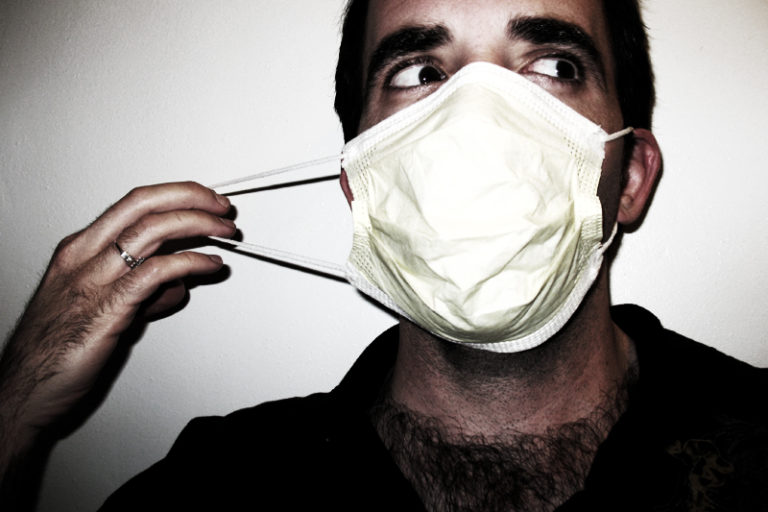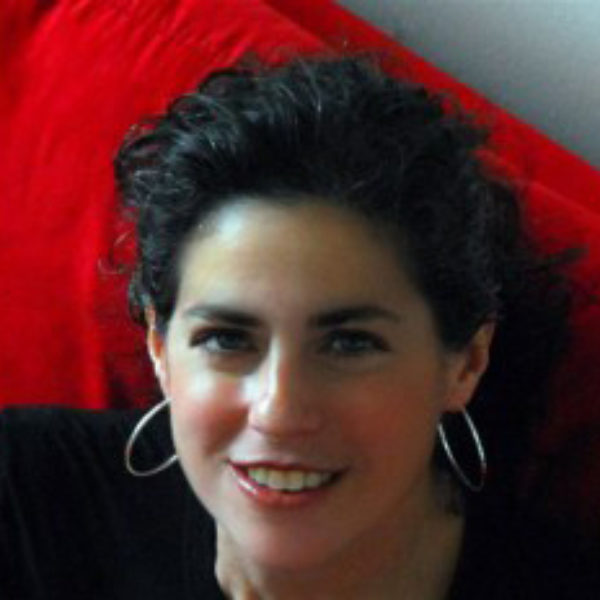
Image by roujo.
A Day in the Life of a Hypochondriac
I was washing my face the other day when I noticed a lump at the base of my neck the size of a jellybean. It’s here, I thought. Throat cancer.
I always feared I would get it, and now here it was. I eyed the “tumor” and wondered where it had been hiding all this time. But after a quick internet search, I realized I didn’t have throat cancer at all. I had thyroid cancer. I immediately called a friend who once had it.
“Thyroid cancer is pretty rare. It might be thyroid disease. That’s hereditary.”
I quickly scanned my internal rolodex of relatives and suddenly remembered, like a bubble floating to the surface, that my mother had a thyroid issue when I was a kid. I called her, and she confirmed that years ago, doctors found a nodule on her right thyroid, and she’d opted to have it removed. Not cancer, she said. I was relieved.
“Uncle Nat, he had thyroid cancer,” my mother said. His doctors kept telling him to wait and see if it grew. “It did,” she said. “He died of it.”
My family peddles medical tragedy like a broker selling municipal bonds. Is it any wonder I’m a hypochondriac? I’ve been fed a constant diet of death and doom since childhood. Mosquito bites that turned out to be tumors. Sun freckles that were cancerous moles. A headache that turned into an aneurysm. It killed him on the spot.
My hypochondria was likely fueled by a childhood medical drama. When I was 11, I went on a camping trip to Florida with a friend and came home with walking pneumonia. After a few trips to the pediatrician, a cardiologist diagnosed a hole in the two upper chambers of my heart and recommended open heart surgery.
With the compression of time, the memories of that period run into each other like beads on a string. You can’t pluck up one without getting the whole strand: the trip to Florida; the sandy lotion the cardiologist used underneath the suction cups she put across my chest as she read the beat of my limping heart; my mother crying in the hallway of my elementary school as she told my teacher what was happening; the sight of my stuffed sheep dog, Herbie, wearing a green surgical cap, as he rode with me on the gurney into the operating room; the sound of my voice repeatedly saying, “Farewell, my lovely,” to relatives who’d gathered in the hospital, until my grandmother told me to stop because it was upsetting my parents.
I don’t know if I really thought I was going to die. “Farewell, My Lovely,” was the name of a movie playing at the time in our local theater. I simply added some dramatic flair.
Nowadays, though, I really do think I’m going to die, on a regular basis, if, say, I get a persistent earache or feel a lump under my arm in the shower. I once had a headache and thought it was because we had a gas leak in our home, emanating from our gas fireplace. I called the gas company, who called the police department, and before long, there were two firetrucks, and two ambulances at my house, my neighbors poured out into the street, and a man with oxygen ran into my home in case it was needed. My fear turned out to be unfounded.
My hypochondria, which in the latest edition of the Diagnostic and Statistical Manual of Mental Disorders is called Health Anxiety Disorder, may have been reinforced by my father’s death of esophageal cancer at 62, an illness that seemed to come out of nowhere, display itself as a bunch of bumps that resembled cysts and bug bites, and then kill him in just 10 months.
But lots of people have parents who die, and not everyone develops Health Anxiety Disorder.
“It’s not clear why some people’s anxiety manifests itself in health symptoms and for other, it does not,” says psychiatrist Arthur Barsky. “Why do some anxious people develop obsessive compulsive disorder while others develop panic attacks? It’s just a function of the way their minds work,” he said, though he acknowledges there are some predisposing factors, such as whether the person had a serious illness in childhood or whether their parent did. Another factor, he said, is how the parents responded to illness: did they rush the child to the pediatrician at the first sign of sickness?
“How alarmed did the parents get? How quickly did they take you to the pediatrician? That can set people’s thermostats.”
In her book A Condition of Doubt: The Meanings of Hypochondria, Catherine Belling suggests it is not irrational to be a hypochondriac: we all die eventually, and most of us get sick before that happens. But it is also not adaptive; we need to ignore some truths in order to function, Belling says.
The question is, which “truths” to ignore and which to heed? My fear is that I will be cured of my hypochondria, and I’ll spot a suspicious mosquito bite or rash, and I won’t call my doctor — and it will turn out to have been cancerous — which is the kind of thing one thinks if they’re a hypochondriac. I eyed the jellybean on my neck and called my doctor.
“I don’t see anything,” the doctor said.
“This, here,” I said, craning my neck.
He wasn’t my regular doctor. She was booked for months. My situation couldn’t wait. The fact that this guy had appointments available did not give me confidence in his abilities. He was also about 80. “Let’s wait and see,” he said.
And so they waited, and she died of it, I could hear my mother saying at Mah Jong.
By the time I got home, the doctor called back. “Let’s schedule an ultrasound. Just to be sure,” he said. The morning after the ultrasound, I got a call from the doctor. I had just dropped my five-year-old son off at school. I pulled off the road when I heard his voice.
“They found a tiny nodule, but it’s so small, it’s insignificant,” he said. Let’s wait and see, he said again. After we hung up, I decided to get a second opinion. Just then, the phone rang. It was my doctor again.
“It says in the report that they found two, a few, tiny nodules on the right side. I’d like you to call an endocrinologist. I’ll send you a referral,” he said, and he hung up. I considered that my ‘second opinion.’ I can’t believe this is really happening, I thought. I may not see my son grow up.
The endocrinologist’s waiting list was longer than that of my doctor. His next appointment wasn’t for two months. “What if the cancer grows in that time?” I asked the receptionist. “It doesn’t grow that fast,” she said. I’m sure my Uncle Nat would disagree.
The morning of my appointment, I waited for my husband to wish me luck.
“Aren’t you going to say anything?” I said.
“About what?”
“I have my thyroid appointment.”
“Oh, shoot. I spaced,” he said.
“I might have cancer, and you spaced?”
“You don’t have cancer,” he said, dismissively.
I wished I did, just to spite him.
I brought a book, my laptop, three magazines and a notepad to the doctor’s office, thinking if I had to wait two months for an appointment, I’d likely have to wait hours in his office. I was called within minutes.
I sat on the examining table and told the nurse and then the doctor about my open heart surgery, how I’d been tired for the last 20 years, how I’d once taken antibiotics for six months because a urologist had prescribed it, how recently I’d had a rash.
“I’m not sure if any of that is related,” I said.
“They’re not,” he said, his head buried in my file.
When he looked up, he inspected my neck and said, “Everything looks fine.”
He said he wasn’t concerned about the nodules at all and that they were so microscopic, he wouldn’t even be able to biopsy them at this point if he wanted to.
“Let’s schedule another ultrasound in a year just for the heck of it, not because I think anything is there, but because of your family history,” he said. And with that he shut my folder and walked out.
I exhaled and let out a whimper, like a squeak. Sometimes you don’t realize you were holding your breath until you feel the exhale.
One of my favorite short stories is by Ernest Hemingway and is called “A Day’s Wait.” It’s about a nine-year-old boy who gets a fever and for an entire day believes he is dying, because the doctor said he had a 102 degrees Fahrenheit fever and he’d heard in France, where Celsius is used, that one cannot live with a temperature over 44 degrees. When the boy realizes he is not dying, Hemingway writes, a great weight is lifted off of him, and the next day, “he cried very easily at little things that were of no importance.”
As a hypochondriac, I’ve had many of these moments, that instance when you realize the impending doom was just a bad dream, a false alarm, the babbling of a hysterical mind. And then I feel light, reborn, and wonder whether that’s why I have these scares — to feel this relief afterward, like couples who fight so they can feel the sweetness of love lost and then regained.
After the doctor left, I walked out to my car, reveling in that sweet spot just after the reprieve and before the next death sentence is passed. For a few moments, I float in the space that only artists see, the space between two objects.


Share your reflection